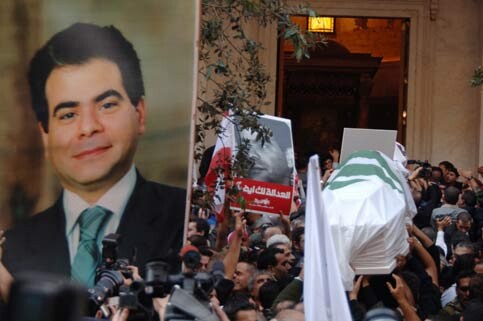The Electronic Intifada 26 November 2006

A view of the mass funeral of assassinated Lebanese minister, Pierre Gemayel, Beirut, 23 November 2006. (Dina Debbas/IRIN)
Commentators and columnists are agreed. Pierre Gemayel’s assassination must have been the handiwork of Syria because his Christian Phalangists have been long-time allies of Israel and because, as industry minister, he was one of the leading figures in the Lebanese government’s anti-Syria faction. President Bush thinks so too. Case, apparently, settled.
Unlike my colleagues, I do not claim to know who killed Gemayel. Maybe Syria was behind the shooting. Maybe, in Lebanon’s notoriously intrigue-ridden and fractious political system, someone with a grudge against Gemayel — even from within his own party — pulled the trigger. Or maybe, Israel once again flexed the muscles of its long arm in Lebanon.
It seems, however, as if the last possibility cannot be entertained in polite society. So let me offer a few impolite thoughts.
As anyone who watches TV crimes series knows, when there is insufficient physical evidence in a murder investigation for a conviction, detectives examine the motives of the parties who stood to benefit from the crime. Better detectives also consider whether the prime suspect — the person who looks at first sight to be the guilt party — is not, in fact, being turned into a fallguy by one of the other parties. The murderer may be the person who benefits most clearly from the crime, or the murderer may be the person who benefits from the prime suspect being fingered for the murder.
As most of our politicians and the media’s commentators have deduced, suspicion falls automatically on Syria because the Christian Phalangists are one of Syria’s main enemies in Lebanon. Partly as a result, they have opposed recent attempts by Syria’s main ally in Lebanon, the Shiite group Hizbullah, to win a greater share of political power.
They are also — and this seems to clinch it for most observers — part of the majority in the pro-American government of Fuad Siniora that supports a United Nations tribunal to try the killers of Rafik Hariri, an anti-Syria politician and leader of the Sunni Muslim community, who was blown up by a car bomb more than a year and a half ago.
After all six Shiite ministers walked out of the Siniora cabinet two weeks ago, and now with Gemayel’s assassination, the government is close to collapse, and with it the tribunal that everyone expects to implicate Syria in Hariri’s murder. If Syria can “bump off” another two cabinet ministers and the government loses its quorum, Syria will be off the hook — or so runs the logic of Western observers.
But does this “evidence” make Syria the prime suspect or the fallguy? How will Syria’s wider interests be affected by the killing, and what about Israel’s interests in Gemayel’s death — or rather, its interests in Hizbullah or Syria being blamed for Gemayel’s death?
In truth, Israel will benefit in numerous ways from the tensions provoked by the assassination, as the popular and angry rallies in Beirut against Syria and Hizbullah are proving.
First, and most obviously, Hizbullah — as Syria’s main political and military friend in Lebanon — has been forced suddenly on to the back foot. Hizbullah had been riding high after its triumph over the summer of withstanding the Israeli assault on Lebanon and routing an invasion force that tried to occupy the country’s south.
Hizbullah’s popularity and credibility rose so sharply that the leaders of the Shiite community had been hoping to cash in on that success domestically by demanding more power. That is one of the reasons why the six Shiite ministers walked out of Siniora’s cabinet.
Despite the way the Shiite parties’ political position has been presented in the West, there is considerable justification for their demands. The system of political representation in Lebanon was rigged decades ago by the former colonial power, France, to ensure that power is shared between the Christian and Sunni Muslim communities. The Shiite Muslims, the country’s largest religious sect, have been kept on the margins of the system ever since, effectively disenfranchised.
With their recent military victory, this was the moment Hizbullah hoped to make a breakthrough and force political concessions from the Sunnis and Christians, concessions that indirectly would have benefited Syria. With Gemayel’s death, the chances of that now look slim indeed. Hizbullah, and by extension Syria, are the losers; Israel, which wants Hizbullah weakened, is the winner.
Second, the assassination has pushed Lebanon to the brink of another civil war. With a political system barely able to contain sectarian differences, and with the various factions in no mood to compromise after the spate of recent assassinations, there is a real danger that fighting will return to Lebanon’s streets.
This will most certainly not be to the benefit of Lebanon or any of its religious communities, who will be dragged into another round of bloodletting. Hizbullah’s underground cadres who took on the Israeli war machine will doubtless have to come out of hiding and will pay a price against other well-armed militias.
The benefits for Syria are at best mixed. A possible benefit is that a bloody civil war may increase the pressure on the United States to talk to Syria, and possibly to invite it to take a leading role again in stabilising Lebanon, as it did during the last civil war.
But, given the continuing ascendancy of the hawks in Washington, it may have the opposite effect, encouraging the US to isolate Syria further.
Conversely, civil war may pose serious threats to Syrian interests — and offer significant benefits to Israel. If Hizbullah’s energies are seriously depleted in a civil war, Israel may be in a much better position to attack Lebanon again. Almost everyone in Israel is agreed that the Israeli army is itching to settle the score with Hizbullah in another round of fighting. This way it may get the next war it wants on much better terms; or Israel may be able to fight a proxy war against Hizbullah by aiding the Shiite group’s opponents.
Certainly one of the main goals of Israel’s bombing campaign over the summer, when much of Lebanon’s infrastructure was destroyed, appeared to be to provoke such a civil war. It was widely reported at the time that Israel’s generals hoped that the devastation would provoke the Christian, Sunni and Druze communities to rise up against Hizbullah.
Third, Syria is already the prime suspect in Hariri’s murder and in the assasination of three other Lebanese politicians and journalists, all seen as anti-Syrian, over the past 21 months.
The US exploited Hariri’s death, and the widespread protests that followed, to evict Syria from Lebanon. Syria’s removal from the scene also paved the way, whether intentionally or not, for Israel’s assault this summer, which would have been far more dangerous to the region had Syria still been in Lebanon.
Despite the looming threat of the UN tribunal into Hariri’s death, from Syria’s point of view the accusations have grown stale with time and threatened to prove only what everyone in the West already believed. With the walk-out by the Shiite ministers from the Lebanese government, the investigations were looking all but redundant in any case.
Gemayel’s assassination, however, has dramatically revived interest in the question of who killed Hariri and brings Syria firmly back into the spotlight. None of this benefits Syria, but no doubt Israel will be able to take some considerable pleasure in Damascus’s discomfort.
Fourth, the Israeli government has been under international and domestic pressure to engage with Syria and negotiate a return of the Golan Heights, an area of Syrian territory it has been occupying since 1967.
With it would be resolved the fraught question of the Shebaa Farms, still occupied by Israel but which Hizbullah and Syria claim as Lebanese territory that should have been returned in Israel’s withdrawal from Lebanon in 2000. The status of the Shebaa Farms has been one of the main outstanding areas of dispute between Israel and Hizbullah.
President Assad of Syria has been hinting openly that he is ready to discuss Israel’s return of the Golan Heights on better terms for Israel than it has ever before been offered.
According to reports in the Israeli media, Assad is prepared to demilitarise the Golan and turn it into a national park that would be open to Israelis. He would probably also not insist on a precise return to the 1967 border, which includes the northern shoreline of the Sea of Galilee. Traditionally Israel’s leaders balked at this idea, and provoked popular fears by conjuring up the vision of Assad’s father, Hafez, dipping his feet in the lake.
But if negotations on the Golan are desperately sought by the young Assad, Israel shows no interest in exploring the option. The Israeli prime minister, Ehud Olmert, has repeatedly ruled out talking to Damascus. That is for several reasons:
Peace with Syria, in Israeli eyes, would inexorably lead to pressure to make peace with the Palestinians. That is most certainly not part of Israel’s agenda.
Gemayel’s death, and Syria being blamed for it, forces Damascus back into the fold of the “Axis of Evil”, and forestalls any threat of talks on the Golan.
Fifth, pressure has been growing in the US Administration to start talking to Syria, if only to try to recruit it to Washington’s “war on terror”. The US could desperately do with local help in managing its occupation of Iraq. It is unclear whether Bush is ready to make such an about-turn, but it remains a possibility.
Key allies such as Britain’s Tony Blair are pushing strongly for engagement with Syria, both to further isolate Iran — the possible target of either a US or Israeli strike against its presumed ambitions for nuclear weapons — and to clear the path to negotiations with the Palestinians.
Gemayel’s death, and Syria’s blame for it, strengthens the case of the neoconservatives in Washington — Israel’s allies in the Administration — whose star had begun to wane. They can now argue convincingly that Syria is unreformed and unreformable. Such an outcome helps to avert the danger, from Israel’s point of view, that White House doves might win the argument for befriending Syria.
For all these reasons, we should be wary of assuming that Syria is the party behind Gemayel’s death — or the only regional actor meddling in Lebanon.
Jonathan Cook is a writer and journalist based in Nazareth, Israel. His book, Blood and Religion: The Unmasking of the Jewish and Democratic State, is published by Pluto Press.
Related Links





